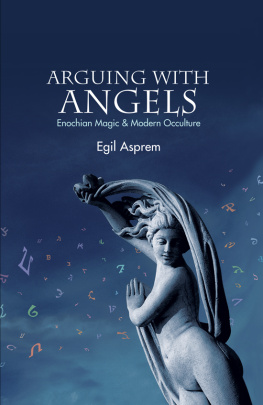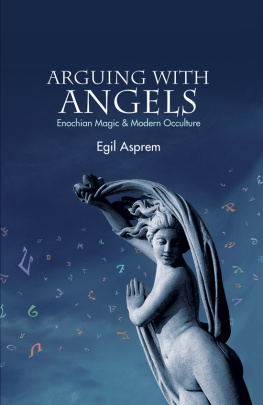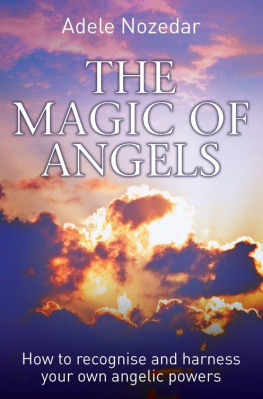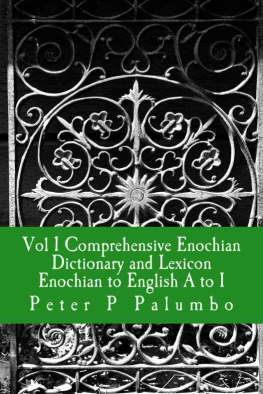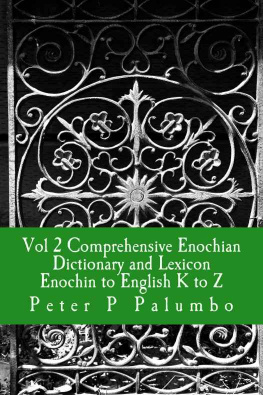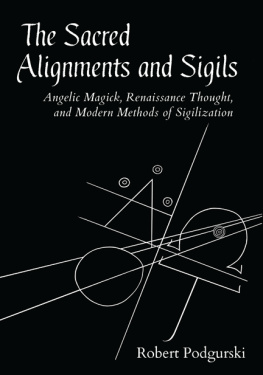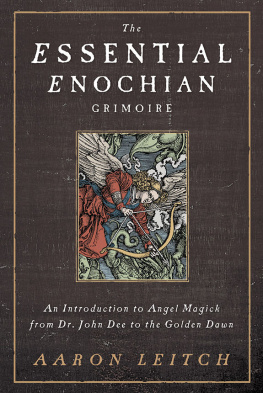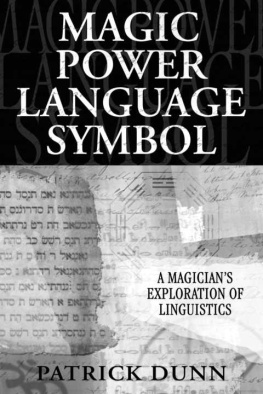Asprem - Arguing with angels: Enochian magic and modern occulture
Here you can read online Asprem - Arguing with angels: Enochian magic and modern occulture full text of the book (entire story) in english for free. Download pdf and epub, get meaning, cover and reviews about this ebook. City: New York;Albany, year: 2012, publisher: State University of New York Press, genre: Religion. Description of the work, (preface) as well as reviews are available. Best literature library LitArk.com created for fans of good reading and offers a wide selection of genres:
Romance novel
Science fiction
Adventure
Detective
Science
History
Home and family
Prose
Art
Politics
Computer
Non-fiction
Religion
Business
Children
Humor
Choose a favorite category and find really read worthwhile books. Enjoy immersion in the world of imagination, feel the emotions of the characters or learn something new for yourself, make an fascinating discovery.
- Book:Arguing with angels: Enochian magic and modern occulture
- Author:
- Publisher:State University of New York Press
- Genre:
- Year:2012
- City:New York;Albany
- Rating:4 / 5
- Favourites:Add to favourites
- Your mark:
- 80
- 1
- 2
- 3
- 4
- 5
Arguing with angels: Enochian magic and modern occulture: summary, description and annotation
We offer to read an annotation, description, summary or preface (depends on what the author of the book "Arguing with angels: Enochian magic and modern occulture" wrote himself). If you haven't found the necessary information about the book — write in the comments, we will try to find it.
Asprem: author's other books
Who wrote Arguing with angels: Enochian magic and modern occulture? Find out the surname, the name of the author of the book and a list of all author's works by series.
Arguing with angels: Enochian magic and modern occulture — read online for free the complete book (whole text) full work
Below is the text of the book, divided by pages. System saving the place of the last page read, allows you to conveniently read the book "Arguing with angels: Enochian magic and modern occulture" online for free, without having to search again every time where you left off. Put a bookmark, and you can go to the page where you finished reading at any time.
Font size:
Interval:
Bookmark:
SUNY series in Western Esoteric Traditions
David Appelbaum, editor
ARGUING WITH
ANGELS
Enochian Magic & Modern Occulture
Egil Asprem

Published by State University of New York Press, Albany
2012 State University of New York
All rights reserved
Printed in the United States of America
No part of this book may be used or reproduced in any manner whatsoever without written permission. No part of this book may be stored in a retrieval system or transmitted in any form or by any means including electronic, electrostatic, magnetic tape, mechanical, photocopying, recording, or otherwise without the prior permission in writing of the publisher.
For information, contact State University of New York Press, Albany, NY
www.sunypress.edu
Production by Ryan Morris
Marketing by Kate McDonnell
Library of Congress Cataloging-in-Publication Data
Asprem, Egil
Arguing with angels : Enochian magic and modern occulture / Egil Asprem.
p. cm. (SUNY series in Western esoteric traditions)
Includes bibliographical references and index.
ISBN 978-1-4384-4191-7 (hardcover : alk. paper) 1. Enochian magicHistory. 2. OccultismHistory. I. Title.
BF1623.E55A87 2012
133.4'309dc23
2011021278
10 9 8 7 6 5 4 3 2 1
LIST OF TABLES
ACKNOWLEDGMENTS
The present book has been in the making approximately since the autumn of 2006. After several years of research and writing, thanks are due to a number of people who have helped out, inspired, and contributed in so many different ways along the way. First of all, my supervisor during the research for my MA degree at the University of Amsterdam between 2006 and 2008, Dr. Marco Pasi, now a colleague at the same institution, deserves a great deal of honor for guiding me through the early process of what evolved into this project. His critical comments on parts of my research have been very valuable, as have his suggestions leading to sources and new discoveries that would otherwise likely have been overlooked. Thanks are also due to other colleagues at the Centre for History of Hermetic Philosophy and Related Currents in Amsterdam, especially Prof. Dr. Wouter J. Hanegraaff, Prof. Dr. Kocku von Stuckrad (now at the University of Groningen), and Dr. Ulrike Popp-Baier, whose conversations and input in earlier stages have shaped my visions for this project. In addition I wish to thank Dr. Asbjrn Dyrendal in Trondheim, who has been a profound influence and motivation for many years, and my friends and colleagues Dr. Kennet Granholm, Jesper Aagaard Petersen, Joyce Pijnenburg, John L. Crow, for many enlightening conversations. Thanks also to Dr. Peter Forshaw, Tessel M. Bauduin, Eduard ten Houten, Joshua Levi Ian Gentzke, and Jason Rose, and to Martin Palmer and Forum Nidarosiae for giving the opportunity to try out my ideas in the summer of 2009.
Parts of the research for this book would have been impossible without contact with knowledgeable people in the world of the occult. I am especially indebted to those well-placed gentlemen who kindly responded to my various inquiries, including Dr. Michael Aquino, Steven Ashe, Al Billings, Clive Harper, Dean Hildebrandt. Runar Karlsen is especially acknowledged for giving his permission to publish parts of his magical work as an appendix to this book, and providing it with an introduction. I wish to thank friends and acquaintances who have shared their rare knowledge with me, and taken time to answer my questions, especially Kjetil Fjell and John Frseth. Ian Rons of The Magickal Review has been of great assistance, and I particularly thank him for supplying the Enochian characters used in of this book.
Acknowledgment is also due to the helpful and efficient staffs of the following institutions: the British Library, Bibliotheca Philosophica Hermetica, the UvA university library, and the Amsterdam Theosophical Library. Finally, has been developed from an article originally published in the journal Magic, Ritual, and Witchcraft, while other parts of arguments presented in the book have been tried out in the journals Aries, The Pomegranate, and Chaos. Acknowledgment is due to the editors and anonymous peer reviewers who have helped refine my arguments at various stages.
Finally, the support and constant encouragement of friends and family has been deeply appreciated. My final thanks go out to my parents, Frank and Wenche Asprem, my sister Nina and brother Isak, to Eva and Einar Asprem, and to my many good friends, both old and new. Finally, a special regard goes out to Hanne Kristin Berg, who was a source of much joy and inspiration during the period when this book started to take shape.
Egil Asprem
AMSTERDAM, FEBRUARY 2011
INTRODUCTION
Never shall be razed out the Memorie of these Actions.
The angel Me to John Dee, March 28, 1583
O n a Friday afternoon late in January 1991 an art student in his late twenties was performing a magical ritual in a little rural house on the outskirts of Oslo. In the middle of the ritual, and quite contrary to the young magician's intentions with it, his visions were wiped out and replaced by what he experienced as a void of purity. In a loud, thundering voice, an unknown spirit started dictating in a strange, unfamiliar language: Ma pratisi kolia navadigi, selig quanisi gon The dictation continued for some time, all scribbled down by the aspiring artist and magician until it comprised a whole book of mysterious words, later to become known under the title Dor OS zol ma thil. Soon he was to discover that the voices he had heard and transcribed were speaking in an arcane language known as Enochian, a language which some believed to be the tongue of the angels.
At the same time, in well-assorted occult bookshops in Oslo, as in any other Western capital, one would find shelves sporting titles such as Enochian Physics, Enochian Tarot, and Enochian Sex Magic. There would be books telling that Enochian had been the language of Atlantis, rediscovered by the Rosicrucians; others that its existence constitutes the clearest proof of the supernatural, and especially the existence of angels. One would read that there existed a whole system of Enochian magic, maybe part of a secret angelic conspiracy to set off the Apocalypse as described in the Book of Revelation; and one would find the Enochian tongue murmured in the liturgy of satanic rituals. If one cared to take a closer look one would even learn that Enochiana had played a role in the prophetic inception of at least two new religious movements. The truth is that Enochiana had been on the lips of occultists and ritual magicians for a hundred years.
All of these claims and theories, speculations and observations belong to the extraordinarily multifaceted reception history of John Dee's sixteenth-century conversations with angels. During the last three decades of his life, the English renaissance scholar had sought divine help to solve puzzles in natural philosophy, and employed several so-called scryers, or crystal gazers, in attempts to uncover secrets from the angels. The best known of these scryers was no doubt Edward Kelleyin part because he was the only one which thoroughly convinced Dee of his skills, and in part because the records of their actions have survived, while those of the others were destroyed or have otherwise been lost over the tumultuous centuries since the late 1500s. In 1659, the magical workings of Dee and Kelley were canonized by the publication of Meric Casaubon's A True and Faithful Relationan account brought to the public with the intention of showing how a good but gullible man was lured into damnation by a cunning nigromancer. The book at first caused a stir, tempting others to try what Dee had done rather than keeping them away from magic. Dee's actions were even discussed by the members of the early Royal Society, sometimes with open scorn for the credulousness of a past generation, sometimes with partial admiration and fascination over the complexity of his work. With the passing of a few generations, however, and the advent of the Enlightenment in the eighteenth century, the curious conversations were largely forgotten.
Next pageFont size:
Interval:
Bookmark:
Similar books «Arguing with angels: Enochian magic and modern occulture»
Look at similar books to Arguing with angels: Enochian magic and modern occulture. We have selected literature similar in name and meaning in the hope of providing readers with more options to find new, interesting, not yet read works.
Discussion, reviews of the book Arguing with angels: Enochian magic and modern occulture and just readers' own opinions. Leave your comments, write what you think about the work, its meaning or the main characters. Specify what exactly you liked and what you didn't like, and why you think so.

